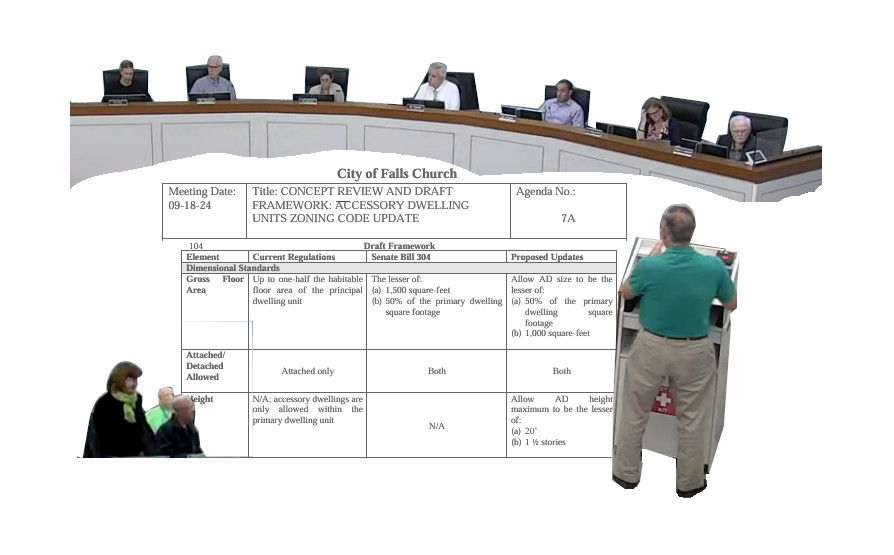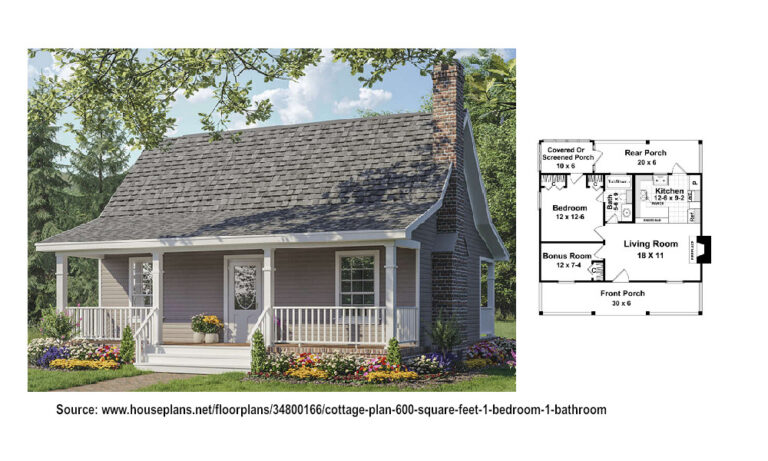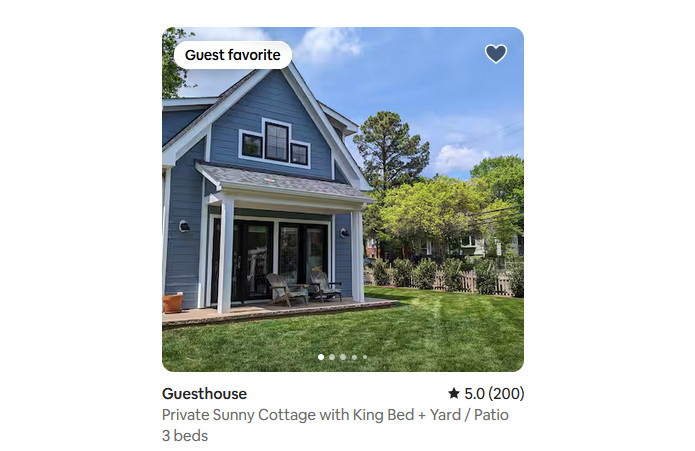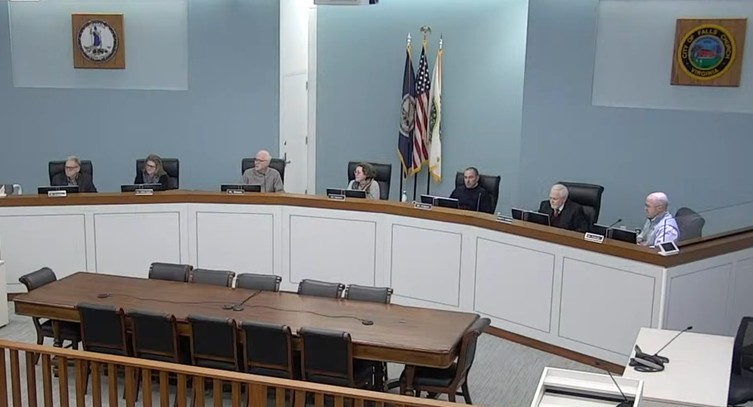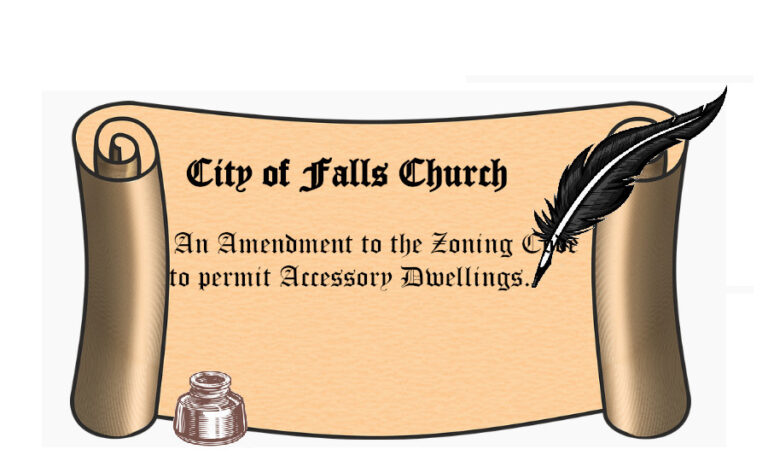Planning Commission, Citizens Urge Caution on Accessory Dwelling Framework during Community Discussions
Summary
- “Be aware of unintended consequences” is the warning raised by both Planning Commissioners and citizens in recent meetings reviewing the City staff’s proposed framework for new zoning on accessory dwellings (ADs). [See the Pulse post, City Council Reviews Draft “Framework” for Accessory Dwellings Zoning Ordinance, September 19, 2024, for a summary of the staff framework.]
- The Planning Commission on September 18, 2024, had an extensive discussion, issue by issue, of the staff’s proposed changes to current single-family zoning to accommodate ADs – one of the most thorough reviews we’ve seen thus far.
- Commissioner Derek Hyra urged staff to be thoughtful and cautious, to get more information, and to recognize the lessons we’ve learned from the recent T-Zone changes. [See Pulse post, Lee Park Townhomes is Approved, Planning Commissioners Reflect on the T-Zone Ordinance, September 26, 2024.] He also noted that some communities are now upset with what they have permitted.
- Commissioner Brent Krasner stated that new construction on residential lots doesn’t all have to be by-right; the Board of Zoning Appeals (BZA) can review those projects that have greater impact on neighbors. Commissioner Sharon Friedlander offered that we could modify regulations later if that proves desirable; six months might be short for trying to work out all the details to differentiate regulations for internal vs. attached vs. detached units. And Chair Rob Puentes requested more data on price points.
- On the other hand, Commissioner Andrea Caumont sought to assure that homeowners can maximize the use of their properties as long as there aren’t adverse impacts on the neighborhood. Commissioner Phil Duncan emphasized that we need to do something as significant for residential lots as the special exception provision that prompted dramatic mixed-use development on commercial lots within the City. Commissioner Tim Stevens noted that if many of the current restrictions stay in place, we won’t get much in response; we can’t afford to wait until everything is certain, he said.
- Of particular interest is the discussion between Commissioners Duncan, Krasner, and Stevens at the 2:24 – 2:30 time stamp regarding the longer-term vision for the City vs. just permitting small dwellings in a few backyards:
Issue by issue discussion
(1) Proposed maximum gross floor area of 1,000 square feet or 50% of the primary dwelling:
- City Senior Planner Jack Trainor indicated that this number was chosen to assure proportionality to the primary home, noting that older homes have more allowance to expand their impervious area, while also considering privacy, tree canopy, and other environmental concerns.
- Commissioner Caumont suggested checking if this limit is acceptable to those wanting to build a detached AD.
- Commissioner Friedlander noted that 1,000 square feet provides a large space and verges on approving a dwelling for three people.
- Commissioner Krasner suggested reducing the percentage to 40%, making the AD clearly accessory. Fairfax County caps the size at 800 square feet except for internal ADs.
- Chair Puentes agreed that 1,000 square feet is large for a detached AD.
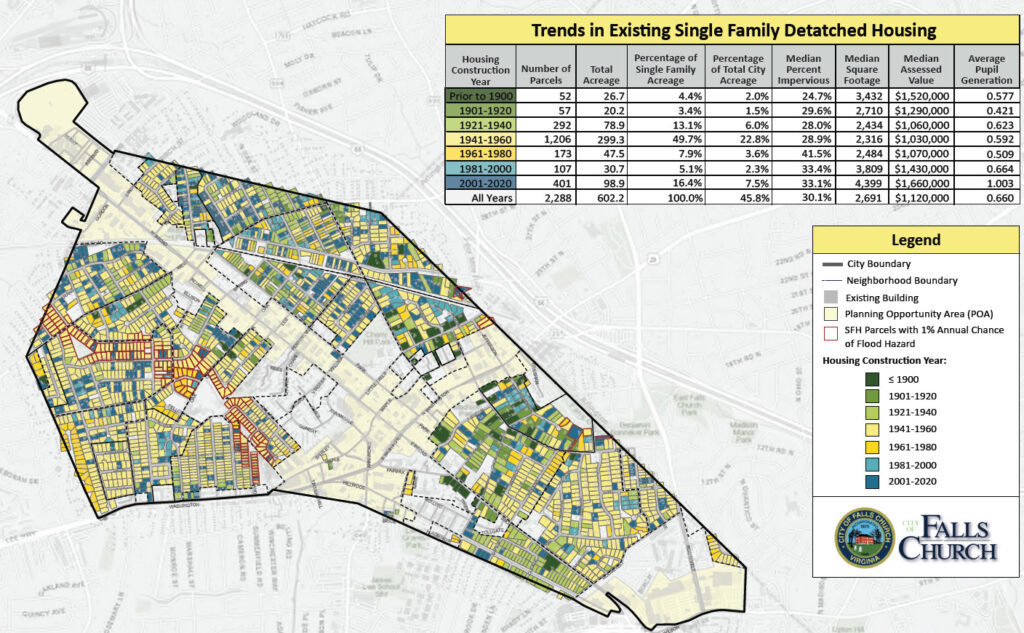
(2) Height limit of 20 feet (measured to mid-height of sloped roof) or 1-1/2 stories:
- Commissioner Krasner suggested that the acceptable height should be related to the setback.
- Commissioner Stevens responded that a 5-foot setback might permit a 1-story height; a 10-foot setback could then permit a 20-foot height.
- Commissioner Duncan noted that the City should encourage units above a garage, permitting sufficient height to accommodate this.
- Commissioner Friedlander stated that the height allowed should be no higher than the peak of the main house, and preferably lower.
(3) Proposed side and rear setbacks of 5 feet from the property line, with a 10-foot setback at the 2nd story if it has windows facing the neighboring property:
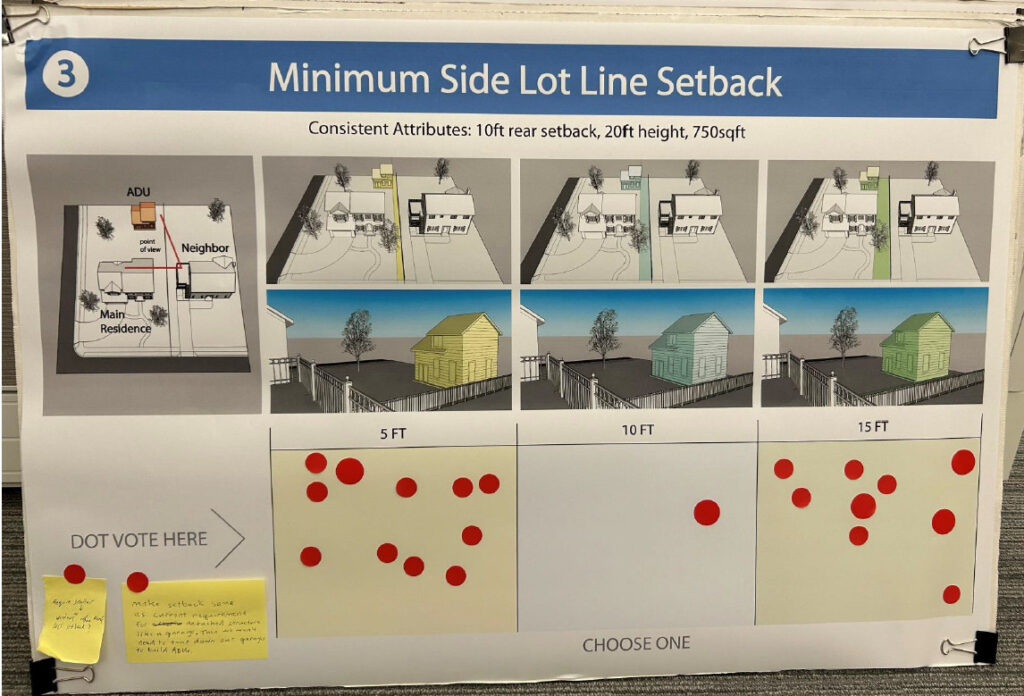
- Mr. Trainor said this proposal was derived from the highest dot votes from previous public sessions. [The Pulse summarized previous AD discussions in Community Discussions on Accessory Dwellings, August 2, 2024.]
- Commissioner Krasner said staff shouldn’t hang their hat on the state bill, which has been deferred. If we get the setbacks right, we shouldn’t have to worry about windows.
- Commissioner Caumont suggested that there might be special rules for corner lots regarding whether ADs can be placed on the side or in front of the main house, and perhaps permitting windows on the 2nd story.
(4) Lot coverage limit maintained at 25%; 35% for impermeable land:
- Commissioner Stevens thought that smaller lots with older homes would be most likely to build detached ADs, which could help preserve our older homes.
- Commissioner Friedlander focused on preserving existing trees.
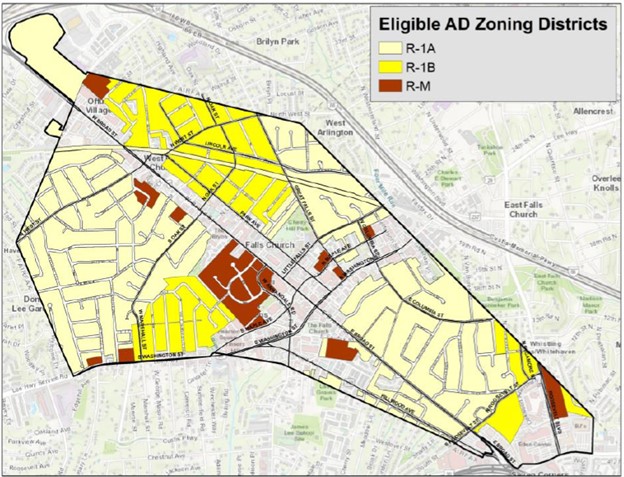
(5) Application of new provisions to R-1A and R-1B lots only:
- Commissioner Krasner suggested that non-conforming lots could be reviewed via the BZA. He preferred only providing by-right to R-1A lots.
(6) No additional requirement for off-street parking for the detached AD:
- Commissioner Duncan suggested an extra car could be disruptive if on the street.
- Commissioner Caumont was concerned about an additional parking space on the lot being impervious. She suggested neighbors concerned about excessive cars parked on the street could seek permit parking or restrictions to park only on one side.
- Commissioner Krasner suggested a single standard, with the BZA to decide on any changes.
(7) No provision regulating rentals, including short-term rentals, which would be left for later discussion in light of existing rentals within the City.
- Planning Director Paul Stoddard proposed that short-term rentals be addressed on a general basis for the whole City, rather than special provisions for ADs.
- Commissioner Hyra said we shouldn’t change zoning rules without addressing the short-term rental issue.
- Commissioner Stevens agreed that short-term rentals change the nature of the neighborhood and undermine affordability.
- Commissioner Krasner said that this is an issue we need to resolve immediately for ADs, including the number of days that short-term rentals might be allowed.
- Chair Puentes agreed that short-term rentals need to be addressed as part of this zoning change.
- Commissioner Caumont agreed that the number of days for short-term rentals could be capped, but said this is a bigger issue and shouldn’t hold up movement on AD zoning changes.
- Commissioner Friedlander indicated that the broader short-term rental should be addressed in tandem with any AD decisions.
(8) The property owner should reside in either the main or accessory dwelling.
- Commissioner Caumont preferred a statement that both the main and accessory dwellings could not be short-term rentals, while dropping the ownership rule.
- Commissioner Krasner disagreed, saying that a no ownership rule would be a giveaway to investors.
- Commissioner Hyra emphasized neighborhood stability, which can be achieved via either ownership or the length of the rental permitted; we should avoid absentee owners.
- Commissioner Duncan raised the issue of State Department employees who are deployed overseas and would want to also rent out the main house.
- Commissioner Krasner responded that renters need to be informed of the rules, so that they are aware if the owner of the AD works for the State Department, they might have to move out if he/she is deployed.
- Commissioner Friedlander suggested a rule that there not be two rentals on a single-family lot.
The Planning Commission discussion of the framework proposal is available at approximately the 2 hours 10 minute timestamp in the video of the meeting.
Public townhalls on September 25 and 29
Citizens were given an opportunity to comment on the new AD framework proposal on two occasions. Approximately 20 people turned out for the first townhall and nearly 35 for the second (which included several members of City Council, the Planning Commission, and other City Boards and Commissions).
The focus of the first town hall session was primarily on detached ADs, with attached ADs seen as the same as a house addition. Some suggested the City wait to learn from Arlington and Alexandria’s experience on detached ADs. Also, participants wondered how the state’s AD bill SB 304, if passed, would impact any new AD ordinance changes.
People spoke about the ability to provide housing for family members, how larger ADs would allow rental to families, and how the expense of building an AD would likely mean only the wealthy could afford them.
Others worried about making a bad parking situation in their neighborhood worse and exacerbating flooding risks in known flood-prone neighborhoods. People expressed concern that having a tall, detached AD next door would alter how they currently can relax in their backyards.
Planning Director Stoddard spoke about what is allowed in today’s accessory structures. He said that they could include bathrooms, bedrooms, offices, and sinks. If such a structure did not have a full-size oven, it would not be an AD. Many such accessory structures exist in the City.
During the second session, there was considerable discussion about the proposed size cap on a detached AD, the need for a general policy on short-term rentals, interest in seeing real-life examples of detached units or determining ways to visualize one on individual lots, and the impact of short-term rentals on longer-term affordable housing.
Participants also discussed the potential impact of ADs on land values and taxes, closing the accessory structure loophole for permissible dwellings, and current and potential regulations on stormwater impacts from neighbors’ construction. They voiced opposition to 5-foot setbacks, questioned access to and the potential cost of utility connections for the AD, expressed the importance of giving equal attention to impacts on neighbors, asked how to address garage conversions, and inquired whether recent mixed-use apartments are filling our “need” to increase housing under current projections.
Senior Planner Trainor indicated that there are currently approximately 30 Airbnb’s in the City, including apartments, houses, rooms, and motel advertisements. Mayor Letty Hardi emphasized that there are over 1,000 Airbnb’s in Arlington, so we shouldn’t expect a large increase here in comparison.
References
- Planning Commission Meeting, September 18, 2024. This official video will not display properly on a small screen as it includes the agenda for the meeting.
- Planning Commission Meeting, September 18, 2024. YouTube video.
- Staff Report: Concept Review and Draft Framework: Accessory Dwelling Units Zoning Code Update, September 18, 2024.
- Accessory Dwellings Update. Official City webpage for following meetings on Accessory Dwellings.
- Accessory Dwellings Update Open House: Draft Framework, September 25, 2024. Presentation given at the September townhalls.
- Single Family Trends Analysis August 2024. Map showing when single family homes were built and a summary analysis.

